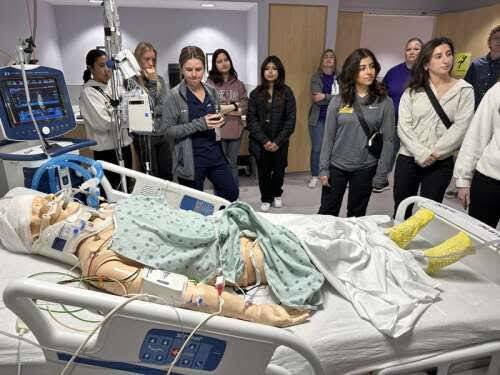Nelly Korda, one of the world’s most formidable figures in professional golf and the current No. 2 in the Rolex Rankings, has recently broken her silence on a troubling medical development that forced her to withdraw from several key tournaments, including the season’s highly anticipated opening major, The Chevron Championship. In a personal message shared via Instagram on Friday, Korda detailed her recent struggle with a serious vascular condition—a blood clot in her subclavian vein—which required surgical intervention. At the same time, her older sister, Jessica Korda, made headlines of her own by securing the runner-up position at the same major, finishing two shots behind Jennifer Kupcho in what marks Jessica’s most impressive performance in a major championship to date.
This juxtaposition of personal hardship and professional triumph within the Korda family has captivated followers of the LPGA and the broader sports world alike. Nelly Korda’s announcement not only pulled back the curtain on her health scare but also framed a larger narrative about resilience, family bonds in elite sport, and the grueling physical demands of professional golf.
A Career Momentarily Paused: Nelly Korda’s Medical Challenge
In her Instagram statement, Nelly Korda wrote with characteristic poise and vulnerability, “I want to thank everyone for the overwhelming support and messages I have received the last few weeks. Your kind words have helped me get through this challenging and scary time.” The 23-year-old’s note continued with a candid assessment: “It wasn’t the start of the year I had hoped for, to say the least.”
The revelation that Korda was battling a blood clot in her subclavian vein—a major vein that runs underneath the collarbone and plays a critical role in transporting blood from the arm back to the heart—adds serious gravity to her withdrawal from competition. Blood clots in this region can be symptomatic of thoracic outlet syndrome (TOS) or can be triggered by repetitive arm movements common in athletes, particularly golfers, swimmers, and baseball pitchers. In Korda’s case, the physical intensity of her swing mechanics and constant travel schedules may well have contributed to her condition, although no specific cause was identified in her statement.
Despite the gravity of the diagnosis, Korda expressed confidence in her recovery, noting that her surgery was successful and that her doctors were pleased with the outcome. “I am now home recovering and preparing to start rehab,” she said, offering a glimpse into the next phase of her return to competitive form. In the same post, images showed Korda with her left arm wrapped in medical bandaging—clear evidence of both the recent surgical procedure and the lingering vulnerability that will shape her short-term athletic future.
For an athlete at the height of her career—ranked second in the world and widely considered one of the most promising and marketable talents on the LPGA Tour—such a setback can be devastating. The early part of the golf season sets the tone for majors, sponsorship visibility, and rankings momentum. Missing The Chevron Championship, which serves as the first major of the calendar year, not only interrupts that rhythm but deprives fans and tournament organizers of one of the tour’s brightest stars.
Understanding the Subclavian Vein and Its Risks in Athletics
The subclavian vein’s role in circulatory function is pivotal, particularly for athletes. When a blood clot forms in this area, the condition is often termed “Paget-Schroetter syndrome” or effort thrombosis. It can lead to arm swelling, pain, and even long-term complications if not treated promptly. In elite athletes, particularly those who rely on repetitive upper-body motion, the syndrome represents a known but rare risk.
Treatment typically involves anticoagulation, and in more severe cases, as with Korda, surgical intervention to remove the clot and potentially decompress the thoracic outlet area. That Korda underwent surgery speaks to the seriousness with which her medical team approached the situation. Fortunately, early diagnosis and surgical advances in treating such conditions often result in full recoveries, especially in young and otherwise healthy individuals.
What remains uncertain, however, is the precise timeline for her return. While she has expressed optimism about rehabilitation, recovery from this type of surgery—particularly for someone who plays a sport involving intensive arm use—must be approached with caution. Rehab may require both physical therapy and a careful reintroduction to practice, potentially spanning several months. With multiple majors and the Olympics on the horizon, the timing of her full return remains one of the LPGA’s most pressing unknowns.
A Family Affair: Jessica Korda’s Career-Best Major Finish
While Nelly’s health dominated headlines, another member of the Korda family was quietly etching a career milestone into the history books. Jessica Korda, Nelly’s elder sister and fellow LPGA star, delivered her best-ever performance in a major championship by finishing runner-up at The Chevron Championship. She closed the tournament just two strokes behind Jennifer Kupcho, an achievement that underscores both her consistency and capacity to rise to the occasion.
Jessica’s result is remarkable not only for its technical merit but for the emotional weight it likely carried. Competing at a major event while her younger sister was undergoing surgery and recovering from a serious medical condition must have introduced a deeply personal complexity to her performance. The Korda sisters have long been admired for their mutual support and shared success, often practicing together, sharing caddies at times, and frequently appearing in each other’s corner—literally and figuratively—during tournaments.
It is worth noting that Jessica’s runner-up finish at The Chevron Championship is not just a familial footnote; it represents a significant professional breakthrough. Though a consistent performer with several LPGA titles to her name, a top-two finish in a major offers both financial and reputational rewards. The LPGA Tour has long been marked by a depth of talent and a level of international competitiveness that makes every major podium finish a hard-fought achievement.
Jennifer Kupcho’s Role in the Narrative: A Championship Claimed
Jennifer Kupcho, who edged out Jessica Korda to win The Chevron Championship, adds another layer of depth to this unfolding narrative. As the tournament winner, Kupcho affirmed her rising status on the LPGA Tour and seized one of the most coveted titles in women’s golf. Her win, while perhaps lost in the shadow of Nelly Korda’s health revelations, deserves recognition for its competitiveness and composure under pressure.
Kupcho, a former NCAA champion and a promising talent on the professional stage, has steadily built a reputation for high-level play, and her victory at Chevron may well signify a shift in the balance of power at the top of the tour—especially with Korda sidelined for an uncertain duration. Her performance over the four rounds of the major also speaks to the increasingly diverse and unpredictable nature of women’s professional golf, where emerging stars challenge veterans and rankings shift with every major.
The Broader Implications for the LPGA Tour
Nelly Korda’s temporary withdrawal from the tour due to medical reasons comes at a time when the LPGA is striving to build global momentum, deepen its sponsorship engagements, and increase visibility. Korda, with her youth, talent, and marketability, is central to that push. Her absence—even if only temporary—creates a vacuum both competitively and commercially.
In recent years, the LPGA has enjoyed rising viewership and increasing parity among top players, but stars like Korda are crucial for maintaining fan engagement and growing the sport’s audience. According to LPGA commissioner Mollie Marcoux Samaan, athlete health and longevity are becoming increasingly prioritized, especially as training regimens intensify and travel schedules grow more demanding. In this light, Korda’s situation could spark broader conversations about wellness protocols, injury prevention, and scheduling flexibility within the tour.
Moreover, the emotional and symbolic power of a sibling duo like Nelly and Jessica Korda playing concurrently—and at elite levels—has always been a unique promotional asset. Their shared success draws fans, sponsors, and media attention, offering a rare familial storyline in professional sport that resonates far beyond the golfing community. The temporary halt to that dynamic, however, highlights just how fragile even the most compelling narratives can be when health concerns enter the frame.
Recovery and Road Ahead: What Comes Next for Nelly Korda
As of her last update, Nelly Korda is home and beginning the early phases of rehabilitation. While no specific timeline has been shared for her return to play, fans and analysts alike will be monitoring her social media, LPGA updates, and tournament entry lists for signs of a comeback. Her reference to “starting rehab” and her hope to “get back to 100% so I can begin practicing” indicate an athlete already mentally preparing for the discipline and patience recovery will demand.
In high-performance sports, the mental toll of injury can be as daunting as the physical. Athletes accustomed to rigorous competition and constant progression must recalibrate their expectations and summon a different type of resilience. For Korda, who has previously shown the mental fortitude required to win on golf’s biggest stages—including a major title at the 2021 KPMG Women’s PGA Championship—this moment is likely to test her in new and unforeseen ways.
Still, her openness in sharing details of her condition and her gratitude toward supporters suggest a maturity beyond her years and an appreciation for the fragility of a professional career. Whether she returns to action in time for upcoming majors, or later in the season, the story of her recovery is likely to serve as a powerful testament to both medical advancement and personal strength.
Final Reflections: A Season Redefined by Adversity and Achievement
The unfolding of this story—beginning with the alarming announcement of Nelly Korda’s blood clot, followed by successful surgery, emotional recovery, and sister Jessica Korda’s near-triumph at a major—presents a rare intersection of personal vulnerability and professional excellence. Jennifer Kupcho’s championship win further anchors this moment in LPGA history as one defined by dynamic shifts and evolving legacies.
For Nelly Korda, the coming months will center on health, rehabilitation, and eventual return. For Jessica, the Chevron runner-up finish could signify a new chapter of elite competitiveness. And for Kupcho, the moment of victory at a major may be the prelude to a long reign at the top.
Together, these parallel stories illuminate the many facets of professional golf—the brilliance, the unpredictability, and the deeply human stories that unfold just beneath the surface of leaderboard statistics. Though the 2025 season has begun with uncertainty for one of its brightest stars, it has also revealed depths of strength, grace, and possibility that may ultimately define it.


Leave a Reply